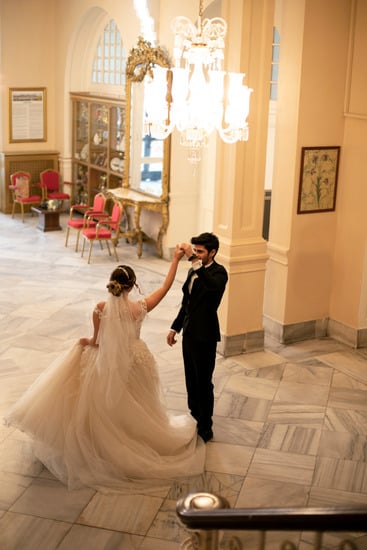
Are you struggling with wedding RSVP wording? Planning a wedding is an exciting and often overwhelming experience, and one of the most important aspects is ensuring that your guests can RSVP in a clear and timely manner. The wedding RSVP wording sets the tone for how guests will respond to your special day, so it’s crucial to get it right.
In this article, we will explore traditional and modern RSVP wording etiquette, tips for creating clear and easy-to-understand RSVP cards, and how to handle special circumstances such as dietary restrictions or children. We’ll also discuss the importance of timing when sending out RSVPs and when to expect responses, as well as common mistakes to avoid.
The RSVP (Répondez s’il vous plaît) has been an integral part of event planning for centuries, serving as a request for a response from the invited guests. While the purpose remains the same, the wording and etiquette have evolved over time. By understanding traditional RSVP wording etiquette and modern creative ideas, couples can add a unique touch to their wedding invitations while ensuring that guests understand how to respond.
In addition to managing RSVPs for the main event, there are other pre-wedding celebrations such as rehearsal dinners and bridal showers that require thoughtful handling of responses. Creating a seamless experience for both the couple and their guests begins with clear and thoughtful wedding RSVP wording. Let’s dive into some best practices for creating effective wedding RSVPs that will make the entire planning process smoother for everyone involved.
Modern and Creative RSVP Wording Ideas for a Unique Touch
When it comes to your wedding RSVP wording, there are plenty of opportunities to infuse your personality and creativity. Modern couples are taking a more relaxed approach to their wedding invitations and RSVPs, allowing for more fun and unique wording options.
One popular trend is using playful and informal language that reflects the couple’s personal style. For example, instead of the traditional “Accepts with Pleasure / Declines with Regret,” you could say “Can’t wait to celebrate / Sorry to miss out”.
Another creative idea is to include prompts for guests to share their favorite songs, memories, or marital advice on the RSVP card. This not only adds a personal touch but also builds excitement for the big day. Additionally, some couples are opting for non-traditional response options such as checkboxes with humorous answers or even requesting song requests or dance floor dedications.
Incorporating humor into your RSVP wording can also create a lighthearted and enjoyable experience for your guests. Couples are getting more creative with their wording by using puns, inside jokes, or funny anecdotes that reflect their love story.
Just be sure to keep the tone in line with the overall style of your wedding so that it feels cohesive. By thinking outside the box and infusing some creativity into your RSVP wording, you can set the tone for a truly memorable celebration.
| RSVP Wording Idea | Description |
|---|---|
| Prompts for Sharing | Include space on the RSVP card for guests to share songs, memories, or marital advice |
| Humorous Response Options | Use checkboxes with funny answers or request song requests/dance floor dedications |
| Incorporating Humor | Add puns, inside jokes, or funny anecdotes that reflect the couple’s love story |
How to Handle RSVPs for Different Wedding Events (Rehearsal Dinner, Bridal Shower, Etc)
When it comes to wedding events, the RSVP process can become a bit more complicated. Here are some tips on how to handle RSVPs for different wedding events such as the rehearsal dinner and bridal shower.
Rehearsal Dinner
The RSVP process for the rehearsal dinner should be separate from the wedding RSVP. When sending out invitations to the rehearsal dinner, make it clear that you are requesting a separate response for this event. This will help you get an accurate headcount for the dinner without any confusion with the wedding RSVPs.
Bridal Shower
For the bridal shower, consider having a designated person, such as the maid of honor or a family member, handle the RSVPs. Include their contact information in the invitation so that guests know who to respond to. Additionally, when wording the invitation, be sure to specify if it is a “surprise” bridal shower or not, as this can impact how guests should respond.
Other Wedding Events
If there are other pre-wedding events such as a welcome party or post-wedding brunch, handle these RSVPs similarly to the rehearsal dinner and bridal shower. Clearly indicate on the invitations whether or not responses to these events should be included with the wedding RSVPs. Also, consider creating separate RSVP cards for each event to avoid any confusion.
Handling different wedding event RSVPs requires clear communication and organization. By following these tips and providing specific instructions on each event’s invitation, you can ensure that you receive accurate guest counts and minimize any confusion during the planning process.
Tips for Creating RSVP Cards That Are Clear and Easy for Guests to Understand
Creating clear and easy-to-understand RSVP cards is crucial in making the wedding planning process smoother for both the couple and their guests. Here are a few tips to keep in mind when designing your RSVP cards:
Use Simple Language
When wording your RSVP card, it’s important to use simple and straightforward language. Avoid using jargon or complex phrases that may confuse your guests. Clearly state the requested information such as the guest’s name, their response (accepts or declines), and the deadline for responding.
Provide Clear Instructions
In addition to using simple language, it’s essential to provide clear instructions on how to respond. Whether you choose to have guests mail back the RSVP card, visit a wedding website, or RSVP by phone or email, be sure to include detailed instructions for each option.
Include Essential Information
Your RSVP card should include all the necessary information such as the date by which guests need to respond, the names of those invited (or how many seats are reserved for them), and any additional details like meal choices or dietary restrictions. Providing this information upfront can help prevent confusion and ensure that guests provide all necessary details in their response.
By following these tips, couples can create RSVP cards that are not only clear and easy for their guests to understand but also help streamline the wedding planning process. It’s important to remember that thoughtful and well-designed RSVP cards contribute to creating a seamless experience for everyone involved in the celebration.
RSVP Timeline
When it comes to wedding planning, creating a timeline for sending out RSVPs and expecting responses is crucial for ensuring that everything is organized and on schedule. Sending out RSVPs at the right time and setting clear expectations for when responses are due can help couples stay on top of their guest list and make necessary arrangements with vendors.
Additionally, providing guests with a timeline for when they can expect to receive responses can help manage expectations and reduce stress for both the couple and their invitees.
For most weddings, it is recommended to send out RSVP cards around 6-8 weeks before the wedding date. This allows guests enough time to consider their schedules, make travel arrangements if necessary, and send in their response by the requested date. For destination weddings or events that require additional planning, such as a rehearsal dinner or bridal shower, it may be advisable to send out RSVPs even earlier to give guests more time to prepare.
In terms of when couples can expect responses from their guests, setting a specific deadline on the RSVP card is essential. Typically, the deadline should be around 2-3 weeks before the wedding date to allow sufficient time for finalizing headcounts and informing vendors about any changes.
It’s important to factor in extra time for unexpected delays in mail delivery or potential follow-ups with guests who have not responded by the deadline. By establishing clear timelines for sending out RSVPs and expecting responses, couples can better manage their wedding preparations and ensure a smooth experience for everyone involved.
Common Mistakes to Avoid When Wording Wedding RSVPs
When it comes to planning a wedding, creating clear and thoughtful RSVP wording is crucial in ensuring a seamless experience for both the couple and their guests. However, there are common mistakes that couples should avoid when wording their wedding RSVPs. Here are some of the key pitfalls to watch out for:
1. Ambiguity: One of the most common mistakes in RSVP wording is being unclear about the deadline for responses or the specific information required from guests. To avoid this, be sure to clearly state the response deadline and provide space for guests to indicate their meal preferences, attendance to additional events, or any other pertinent details.
2. Lack of clarity on plus-one invitations: When inviting guests with a “plus one,” it’s important to clearly indicate if they are allowed to bring a date. Without this clarification, confusion may arise, leading to unexpected additional guests.
3. Overcomplicating the RSVP card: Another mistake to avoid is creating an overly complicated RSVP card. Keep it simple and easy for guests to understand by providing clear instructions and a straightforward format.
In summary, by avoiding these common mistakes such as ambiguity, lack of clarity on plus-one invitations and overcomplicating the RSVP card, couples can ensure that their wedding RSVPs effectively communicate important information while making it easy for their guests to respond promptly.
Handling Special Circumstances on RSVPs (Children, Dietary Restrictions, Etc)
When it comes to handling special circumstances on wedding RSVPs, it’s important to be sensitive and accommodating to the needs of your guests. One common special circumstance that often arises is whether or not children are invited to the wedding. If you have specific preferences about whether children are welcome or not, make sure to clearly indicate this on the RSVP card.
For example, you can include a line that says “We have reserved ___ seats in your honor” and fill in the number of seats allotted for each invited guest. This will make it clear whether or not children are included in the invitation.
In addition to children, dietary restrictions are another special circumstance that couples may need to address on their wedding RSVPs. It’s important to provide a space for guests to indicate any dietary restrictions or allergies they may have. This will help you plan the menu accordingly and ensure that all of your guests can enjoy the food at your wedding without any issues.
Overall, when handling special circumstances on RSVPs, clear communication is key. Make sure that your guests understand what is expected of them and feel comfortable indicating any special needs or requirements they may have. By being thoughtful and considerate in your wording, you can create a positive experience for both you and your guests as you plan for your big day.
Conclusion
In conclusion, the RSVP wording for a wedding is a critical aspect of the planning process. It sets the tone for the entire event and helps ensure that everything runs smoothly on the big day.
Whether you choose to follow traditional etiquette or opt for modern and creative wording, it’s important to make sure that your invitations are clear and easy for guests to understand. By providing a clear RSVP timeline and offering tips for handling special circumstances such as dietary restrictions or children, couples can create a seamless experience for both themselves and their guests.
Clear and thoughtful RSVP wording not only helps with organizing the logistics of the wedding but also shows consideration for the guests. It allows them to communicate their attendance in a timely manner and assists with planning accommodation, catering, seating arrangements, and more. By avoiding common mistakes in RSVP wording and taking into account special circumstances, couples can make their guests feel valued and ensure that everyone has an enjoyable time at their celebration.
Ultimately, the goal of clear and thoughtful RSVP wording is to set the stage for an unforgettable wedding experience. Creating an atmosphere of warmth, appreciation, and attention to detail through well-crafted invitations can contribute to a memorable celebration that will be cherished by all those in attendance. By putting emphasis on this often-overlooked aspect of wedding planning, couples can truly elevate their special day.
Frequently Asked Questions
What Do You Say in a Wedding Response RSVP?
When responding to a wedding RSVP, it’s important to be polite and clear about your attendance. Start by expressing your gratitude for the invitation, then indicate whether you will be attending or not.
If you’re unable to attend, it’s courteous to offer an explanation or best wishes for the couple. It’s also helpful to follow any specific instructions provided, such as dietary restrictions or song requests.
What Is the Formal Wording for Wedding RSVP?
The formal wording for a wedding RSVP should include a brief salutation, such as “Dear [Host’s Name],” followed by a statement of acceptance or regrets. For example, “Accepts with pleasure the kind invitation of [Names] on [date].”
or “Regrets that they are unable to accept the kind invitation of [Names] on [date].” It’s also important to include your name(s) at the bottom for proper identification.
How Do You Write a RSVP Message?
When writing an RSVP message, it’s crucial to keep it concise and clear. Begin with a polite salutation and then express your response clearly and directly. For example, “We are delighted to accept your kind invitation for [event]. We look forward to celebrating with you.”
Or if declining, “We regretfully cannot attend due to prior commitments. Wishing you a beautiful celebration.” Including any necessary details such as dietary restrictions or guest names can also be helpful for the hosts’ planning purposes.




